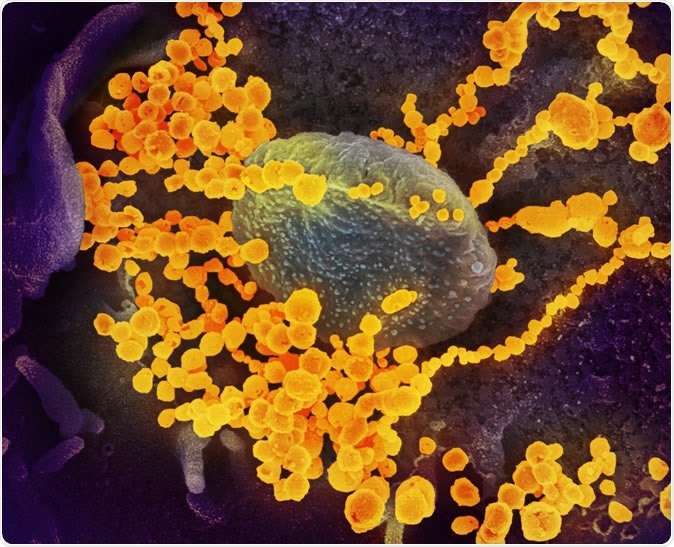The virus was first detected in Wuhan city of Hubei Province in December 2019 and, since then, despite tight control measures, has spread to a large number of nations across the world with the World Health Organization (WHO) declaring it as a global emergency. The new study is titled, "The antiviral compound remdesivir potently inhibits RNA-dependent RNA polymerase from Middle East respiratory syndrome coronavirus."
According to the authors of the study from the University of Alberta, the drug had previously been found to be effective against other similar viruses. The team, therefore, wanted to test the efficacy of Remdesivir against the new COVID-19 strain.

Novel Coronavirus SARS-CoV-2 : This scanning electron microscope image shows SARS-CoV-2 (round gold objects) emerging from the surface of cells cultured in the lab. SARS-CoV-2, also known as 2019-nCoV, is the virus that causes COVID-19. The virus shown was isolated from a patient in the U.S. Credit: NIAID-RML
Remdesivir is a novel antiviral drug in the class of nucleotide analogs. It was developed in 2014 by Gilead Sciences as a treatment for Ebola virus disease and Marburg virus infections, though it has subsequently also been found to show antiviral activity against other single-stranded RNA viruses such as respiratory syncytial virus, Junin virus, Lassa fever virus, Nipah virus, Hendra virus, and the coronaviruses (including MERS and SARS viruses).
According to a statement from virologist Matthias Götte, "Even if you know a drug works, it can be a red flag if you don't know how it works. It is reassuring if you know exactly how it works against the target. We know the drug works against different coronaviruses, like MERS and SARS, and we know the novel coronavirus is very similar to SARS. So I would say I'm cautiously optimistic that the results our team found with remdesivir and MERS will be similar to COVID-19."
Götte said that this was an important work considering the present situation and added that the study looked at the way this antiviral drug worked against the new strain of the coronavirus.
Earlier this year, the drug has been trialed on a patient with coronavirus, the team said. This administration of the drug was in a patient infected with a virus in the United States. The patient received the drug on the seventh day after infection. The symptoms abated on the second day of the drug administration and soon there were no symptoms. The case report was published in the latest issue of the New England Journal of Medicine.
At a press conference in Beijing, assistant director-general of the World Health Organization, Bruce Alyward, in his statement, said that this new drug remdesivir is the only drug at present that has shown any effectiveness against COVID-19.
The team wrote that remdesivir is a new molecule that has shown a broad spectrum of activity against RNA viruses. It has been effective against SARS and MERS. The team explained that remdesivir is actually a nucleotide analog inhibitor that inhibits the RNA-dependent RNA polymerases (RdRps). The team took some of the proteins from the MERS strain of coronavirus called "nsp5, nsp7, nsp8, and nsp12". These are called the non-structural proteins of the virus. These proteins were expressed in insect cells as part of a multiprotein study. Remdesivir was found to be effective in killing the MERS RdRps. They found that two of the proteins – nsp8 and nsp12 form an active complex. Remdesivir's triphosphate form competes with ATP and gets incorporated within the position i. This causes arrest in the process of RNA synthesis at "position i+3" wrote the researchers. This delays the termination of the RNA chain. This meant that remdesivir has high efficacy against these RNA viruses, wrote the researchers as can be detected from the cell-based assays. Clinical trials would reveal in detail the exact mechanism, efficacy, and safety of these agents in COVID-19, the team explained.
Götte said, explaining how the drug works, "What our study showed was that remdesivir essentially mimics one of the natural building blocks for RNA synthesis necessary for genome replication of the virus. Enzymes within the virus are synthesizing the viral RNA genome with these building blocks, but they mix up the bits they need with the drug. Once the drug is incorporated into the growing RNA chain, the virus can no longer replicate." He added that at present clinical trials are looking at the success of this antiviral against the infection. The results are expected by the end of April.
He warned, however, "It's likely we'll need more than one drug to properly fight emerging diseases like COVID-19, as we have with HIV and hepatitis C virus infections. Ideally, we will have a couple of drugs because certain strains could be resistant to certain treatments."
This study was supported by the Canadian Institutes of Health Research and the Alberta Ministry of Economic Development, among others.
Journal reference:
The antiviral compound remdesivir potently inhibits RNA-dependent RNA polymerase from Middle East respiratory syndrome coronavirus Calvin J Gordon, Egor P Tchesnokov1, Joy Y. Feng, Danielle P Porter and Matthias Gotte, https://www.jbc.org/content/early/2020/02/24/jbc.AC120.013056